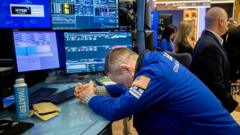Recent tariff announcements from the Trump administration have caused significant upheaval in global markets, leading to fears of an economic downturn.
**US Tariff Uncertainty Fuels Market Volatility**

**US Tariff Uncertainty Fuels Market Volatility**
Investors react as tensions rise over trade amid fluctuating stock values.
As concerns over US tariffs rattle global markets, a sense of volatility swept through trading floors on Monday. The S&P 500 managed to stem some of its losses, ultimately closing down approximately 0.2%, following a series of dramatic trading swings that echoed the turmoil seen during the early days of the Covid-19 pandemic. Investors expressed cautious optimism that President Trump might pivot towards trade negotiations despite his escalating tariff threats against China.
The Trump administration indicated a willingness to engage with over 50 countries regarding trade issues. U.S. Treasury Secretary Scott Bessent stated negotiations with Japan were underway, generating a spark of hope. Trump's mixed signals about tariffs—indicating that some might remain permanent—left investors wondering about the path forward. He firmly rejected suggestions to delay the import taxes on goods from all nations that were introduced last Wednesday.
This turbulent moment follows the sharpest declines in US and UK stock markets since the onset of the Covid crisis, as fears mount over the tariffs' potential impact on both the US economy and global markets. According to analysts, the S&P 500 has already lost over 10% of its value within three days—an alarming trajectory mirroring the financial distress seen in 2008 and the early pandemic panic.
Market reactions have been further complicated by high-profile business leaders expressing their frustration with the current economic policy. Figures such as Jamie Dimon, Bill Ackman, and Daniel Loeb have begun to voice concerns about the sustainability of Trump’s tariff-focused strategy.
On the heels of Trump's threats to impose an additional 50% tariff on Chinese imports unless Beijing reverses its retaliatory measures, the potential for a full-blown trade war looms larger. Analysts warn that failure to yield diplomatic resolutions could lead to detrimental effects on worldwide economies. "Investors are increasingly anxious about the potential for lower corporate profits and an economic slowdown," remarked investment director Russ Mould.
Despite a dizzying 20% drop from its highest February point, optimism surged when a rumor about potential delays in tariff implementation briefly animated trading—showing how sensitive investor sentiment remains amidst such uncertainty. Veteran index analyst Howard Silverblatt remarked upon the extraordinary market swings occurring in recent days, a reflection of the widespread trepidation.
In a broader context, European markets reported declines, with London's FTSE 100 plummeting to its lowest level in over a year. Market fears also led to a drop in oil prices and copper, while gold—a traditional safe haven—saw declines as well. As the situation unfolds, investors and world leaders alike are watching closely, speculating on whether the United States might steer toward renewed trade dialogue or further entrench itself in escalating tariffs.
The Trump administration indicated a willingness to engage with over 50 countries regarding trade issues. U.S. Treasury Secretary Scott Bessent stated negotiations with Japan were underway, generating a spark of hope. Trump's mixed signals about tariffs—indicating that some might remain permanent—left investors wondering about the path forward. He firmly rejected suggestions to delay the import taxes on goods from all nations that were introduced last Wednesday.
This turbulent moment follows the sharpest declines in US and UK stock markets since the onset of the Covid crisis, as fears mount over the tariffs' potential impact on both the US economy and global markets. According to analysts, the S&P 500 has already lost over 10% of its value within three days—an alarming trajectory mirroring the financial distress seen in 2008 and the early pandemic panic.
Market reactions have been further complicated by high-profile business leaders expressing their frustration with the current economic policy. Figures such as Jamie Dimon, Bill Ackman, and Daniel Loeb have begun to voice concerns about the sustainability of Trump’s tariff-focused strategy.
On the heels of Trump's threats to impose an additional 50% tariff on Chinese imports unless Beijing reverses its retaliatory measures, the potential for a full-blown trade war looms larger. Analysts warn that failure to yield diplomatic resolutions could lead to detrimental effects on worldwide economies. "Investors are increasingly anxious about the potential for lower corporate profits and an economic slowdown," remarked investment director Russ Mould.
Despite a dizzying 20% drop from its highest February point, optimism surged when a rumor about potential delays in tariff implementation briefly animated trading—showing how sensitive investor sentiment remains amidst such uncertainty. Veteran index analyst Howard Silverblatt remarked upon the extraordinary market swings occurring in recent days, a reflection of the widespread trepidation.
In a broader context, European markets reported declines, with London's FTSE 100 plummeting to its lowest level in over a year. Market fears also led to a drop in oil prices and copper, while gold—a traditional safe haven—saw declines as well. As the situation unfolds, investors and world leaders alike are watching closely, speculating on whether the United States might steer toward renewed trade dialogue or further entrench itself in escalating tariffs.



















